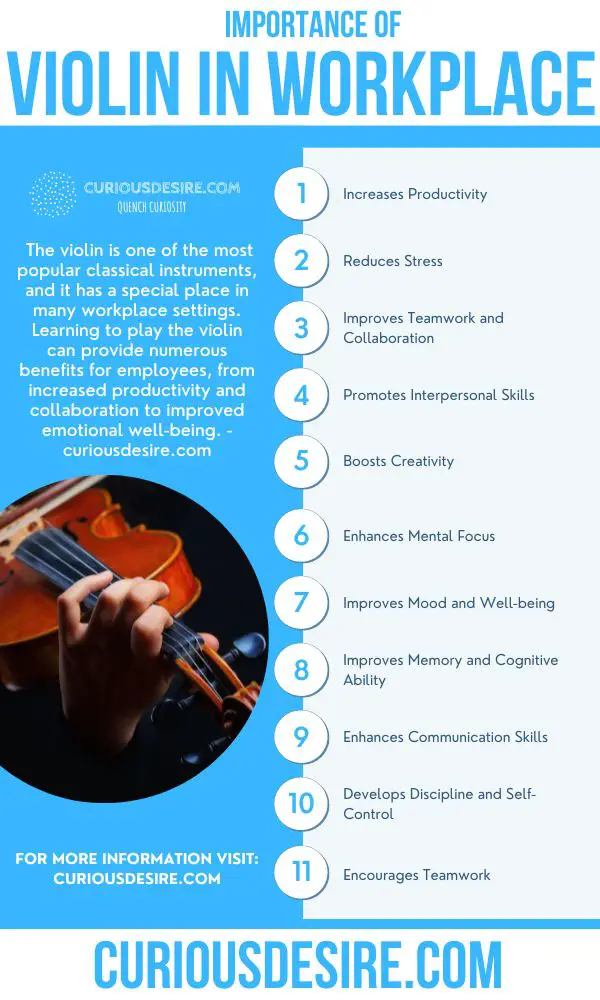The violin is one of the most popular classical instruments, and it has a special place in many workplace settings. Learning to play the violin can provide numerous benefits for employees, from increased productivity and collaboration to improved emotional well-being.
It can also help to improve communication and collaboration within teams and even create a more positive atmosphere in the workplace. In this article, we’ll look at 16 reasons why violin is important in the workplace.
16 Benefits of Violin in the Workplace
Violin is an instrument that can provide a powerful emotional connection to the workplace. Here are 15 reasons why playing Violin should be important in any workplace:
1. Violin Increases Productivity at Workplace
Learning to play the violin can increase productivity in the workplace. It has been proven that learning and playing music increases cognitive abilities, including improved problem-solving skills and creativity.
Productivity boosts can also be gained from the relaxation that playing music provides. Violin also increases self-confidence and concentration, both of which are important in successful work environments.

2. Violin Can Help Reduce Stress at Work
Listening to and playing soothing violin music has been found to reduce stress levels in individuals by decreasing cortisol (the “stress hormone”) production and increasing endorphins, our body’s natural feel-good hormones.
In the workplace, learning to play the violin can reduce stress and create a more pleasant work environment. In this way, companies can benefit from increased creativity and productivity, as well as a better atmosphere.
3. Violin Improves Teamwork and Collaboration
Playing the violin together is an excellent way to foster teamwork and collaboration in the workplace. It encourages employees to work together towards a common goal while also improving communication skills. This allows teams to share ideas more easily and develop better relationships.
Learning to play the violin also helps employees become more aware of each other’s working styles, which can lead to improved collaboration in both personal and professional settings.
4. Violin Promotes Interpersonal Skills
Playing the violin can help people build interpersonal skills such as respect, tact, empathy, and understanding. This can be an effective way to improve relationships and collaboration between employees.
Also, playing the violin encourages employees to have patience with each other and gives them a chance to practice their listening skills.
5. Violin Boosts Creativity in the Workplace
The repetitive nature of learning and playing violin helps to spark creativity in the workplace. This is because music encourages people to think outside the box and come up with unique ideas that could benefit their team or company.
Learning to play violin also provides an outlet for creative expression, which can help employees feel more motivated and engaged at work.
Suggested Readings
Why violin is important in music?
Why violin is important in society?
6. Violin Enhances Mental Focus in the Workplace
Playing the violin can improve brain functioning and focus by activating multiple parts of the brain simultaneously. This helps to improve concentration, allowing employees to stay focused on their tasks for longer periods of time.
The act of playing the violin also encourages mindfulness, which helps people stay in the present moment and resist distractions.

7. Violin Improves Mood and Well-being At Workplace
Listening to and playing soothing music can have a calming effect on both the mind and body, helping people feel more relaxed and stress-free. This leads to improved moods and overall well-being in the workplace, which is beneficial for both employers and employees.
In the workplace, this means employees will be more productive and motivated, leading to higher-quality work outcomes. Additionally, increased happiness and positivity will positively affect the company’s culture, leading to more satisfied employees.
8. Violin Improves Memory and Cognitive Ability
Learning and playing the violin can help to improve memory recall, problem-solving skills, abstract thinking and creative ability. This is because it requires the use of multiple parts of the brain simultaneously, which helps to sharpen one’s cognitive abilities.
In the workplace, this can lead to improved decision-making skills and creativity, helping employees stay ahead of the competition and succeed in their tasks.
9. Violin Enhances Communication Skills
Learning to play violin requires a lot of listening and communication with both instructors and other musicians. This gives employees a chance to practice their communication skills and build meaningful relationships with each other.
These improved communication skills can be beneficial for both personal and professional relationships in the workplace, allowing employees to work more effectively together.
10. Violin Develops Discipline and Self-Control
Learning to play violin requires a lot of dedication and focus. This can help employees develop discipline and self-control, which are important traits for success in the workplace.
With increased discipline and self-control, employees will be better able to stay on task and resist distractions, leading to improved productivity and work outcomes. For instance, they will be more likely to meet deadlines and produce high-quality work.
Suggested Readings
Why violin is important in school?
Why violin is important in the world?

11. Violin Encourages Teamwork
Playing violin in a group setting can be a great way to foster teamwork and collaboration. This is because it requires everyone to listen to one another, work together, and support each other in order for the music to sound good.
In the workplace, this encourages employees to work together and cooperate on projects rather than competing against each other. This leads to better work outcomes and improved performance for the company as a whole.
12. Violin Enhances Self-expression
Playing the violin can be a great way to express oneself and let out emotions that are difficult to verbalize. This can help employees feel more comfortable expressing themselves in the workplace, leading to improved communication and collaboration with colleagues.
Additionally, it also allows employees a creative outlet for self-expression, which can help them to stay motivated and engaged in their work. This leads to improved performance and increased satisfaction in the workplace.
13. Violin Improves Self-confidence
Learning to play the violin can help instill a sense of accomplishment and boost self-confidence, which is beneficial for employees in the workplace.
With increased confidence, employees will be more likely to take initiative and seek new challenges, leading to more creativity and innovation in the workplace.

14. Violin Increases Focus and Concentration
The repetitive nature of practicing violin helps to improve focus and concentration, which are essential skills for success in the workplace.
By being able to stay focused on tasks for longer periods of time, employees will be better able to complete their work efficiently, leading to improved job performance. This is beneficial for both the employee and the company as a whole.
Suggested Readings
Why violin is important in a relationship?
Why violin is important for a child?
Why violin is important for the brain?
15. Violin Promotes Grit and Resilience
Playing violin also helps to build grit and resilience as well. This is because learning a new piece of music involves overcoming challenges, dealing with failure, and persisting through difficult times.
These traits are essential for success in the workplace, allowing employees to become more resilient when faced with adversity or failure. This can lead to improved job performance and greater overall success for the company.
16. Violin Increases Job Satisfaction
Finally, playing the violin can lead to increased job satisfaction for employees. This is because it gives them an enjoyable activity to look forward to after work, allowing them to relax and have fun while still improving their skills.
This improved sense of enjoyment in the workplace leads to higher engagement and motivation levels, which can result in better outcomes for both the employee and the company.
This is why offering violin lessons at the workplace can be such an effective way to increase employee engagement and satisfaction.
Conclusion
Learning the violin can have a tremendous impact on employee performance and satisfaction in the workplace. It encourages discipline and self-control, enhances teamwork, promotes self-expression, improves self-confidence, increases focus and concentration, builds grit and resilience, and leads to greater job satisfaction.
Providing violin lessons in the workplace can be a great way to help employees reach their full potential and make a positive difference for the company as a whole. It’s a win-win situation that can lead to improved performance and greater job satisfaction for everyone involved.
Relevant Articles
Why violin is important in music?
Why violin is important in society?
Why violin is important in school?
Why violin is important in the world?
Why violin is important in a relationship?